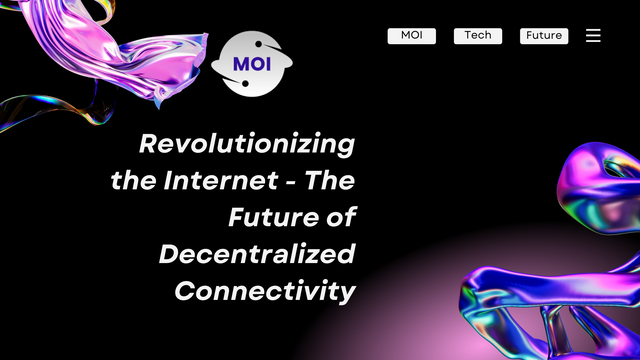
Introduction:
In today's digital age, centralized systems dominate the internet, posing challenges related to privacy, scalability, and control over personal data. However, a transformative solution is on the horizon: MOI (My Own Internet). With its innovative context-aware peer-to-peer (P2P) protocol and network, MOI is poised to redefine the internet as we know it. This blog explores MOI's groundbreaking features, its impact on various sectors, and why it represents the future of decentralized connectivity.
The Need for a New Internet Paradigm:
Limitations of Centralized Systems:
Centralized systems have long been the dominant model for various aspects of our lives, including governance, finance, and communication. However, they come with several limitations that have increasingly raised concerns among individuals and organizations. Two major limitations of centralized systems are data breaches and privacy concerns.
Data Breaches:
Centralized systems concentrate vast amounts of data in one location or organization, making them attractive targets for malicious actors. Despite robust security measures, no system is entirely immune to breaches. High-profile data breaches have become alarmingly common, exposing sensitive information such as personal details, financial records, and login credentials. These breaches can have severe consequences for individuals and can lead to identity theft, financial loss, and reputational damage. Furthermore, centralized systems often store data in a format that makes it easy for hackers to exploit a single point of failure, amplifying the potential impact of a breach.
Privacy Concerns:
Centralized systems often require users to relinquish control of their personal information, trusting that the central authority will handle it responsibly. However, this concentration of power raises concerns about privacy. Users may not have full visibility or control over how their data is collected, stored, and utilized. Centralized entities can exploit personal information for targeted advertising, surveillance, or other undisclosed purposes. Moreover, if the central authority's security measures fail, unauthorized access to personal data can occur, undermining individuals' privacy rights.
In summary, centralized systems are susceptible to data breaches due to their concentration of sensitive information and single points of failure. They also raise privacy concerns as users must trust centralized entities with their personal data. As a result, alternative approaches that address these limitations have gained prominence.
Necessity of Decentralization and Potential Benefits
In light of the limitations of centralized systems, decentralization has emerged as a compelling alternative. Decentralization distributes power, authority, and control across a network, reducing reliance on a single centralized entity. This approach brings several potential benefits to the internet and various domains.
Enhanced Security:
Decentralized systems offer improved security compared to centralized counterparts. By distributing data across multiple nodes or participants, they mitigate the risk of a single point of failure. Even if one node or participant is compromised, the overall network remains intact, reducing the impact of potential breaches. Additionally, decentralized systems often employ cryptographic techniques, enhancing data privacy and protection against unauthorized access.
Data Ownership and Control:
Decentralization empowers individuals with greater control over their own data. By storing data on distributed networks, users can maintain ownership and decide how their information is shared and utilized. This approach shifts the balance of power from centralized authorities to individuals, ensuring that personal data is not exploited without consent. Users can also leverage encryption and cryptographic tools to maintain privacy and selectively disclose information on their terms.
Resilience and Redundancy:
Centralized systems are vulnerable to disruptions caused by natural disasters, infrastructure failures, or targeted attacks. In contrast, decentralized systems can exhibit higher resilience and redundancy. Distributed networks ensure that even if some nodes or participants go offline, the network as a whole continues to function. This resilience makes decentralized systems more robust, reliable, and less susceptible to single points of failure.
Innovation and Collaboration:
Decentralization fosters innovation and collaboration by enabling open participation and removing gatekeepers. Anyone with the necessary skills and resources can contribute to the network, fostering a diverse and vibrant ecosystem. Decentralized systems often employ consensus mechanisms that allow participants to collectively make decisions and govern the network. This inclusive approach encourages creativity, diversity of ideas, and democratization of decision-making.
In conclusion, decentralization addresses the limitations of centralized systems by offering enhanced security, empowering individuals with data ownership and control, providing resilience and redundancy, and fostering innovation and collaboration.
By embracing decentralization, the Internet can evolve into a more equitable, secure, and user-centric ecosystem that respects privacy and promotes individual empowerment.
MOI represents the future of decentralized connectivity, offering a paradigm shift in how we experience and interact with the internet. Through its context-aware P2P protocol, decentralized identity solution, personalized storage network, and immersive metaverse experience, MOI empowers individuals while addressing the limitations of centralized systems. With MOI's remarkable achievements within the first 100 days of the Indus Test Net, it is clear that a new era of internet connectivity is dawning. As MOI continues to advance, it promises to reshape industries, restore privacy, and revolutionize the way we engage with the digital world.
Go through its vision and mission at https://moi.technology
Join the community at https://t.me/moi_tech
Follow twitter at https://twitter.com/moi_tech